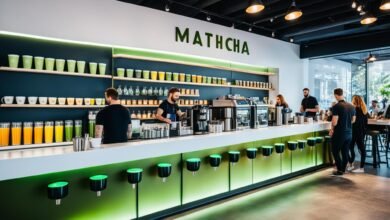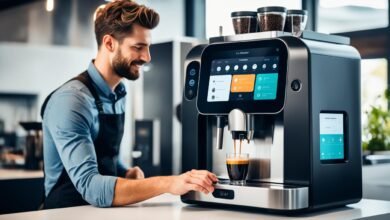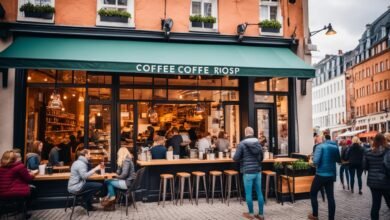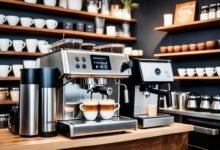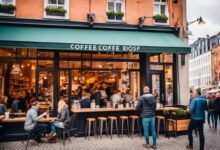Sustainable Coffee Practices: From Bean to Cup
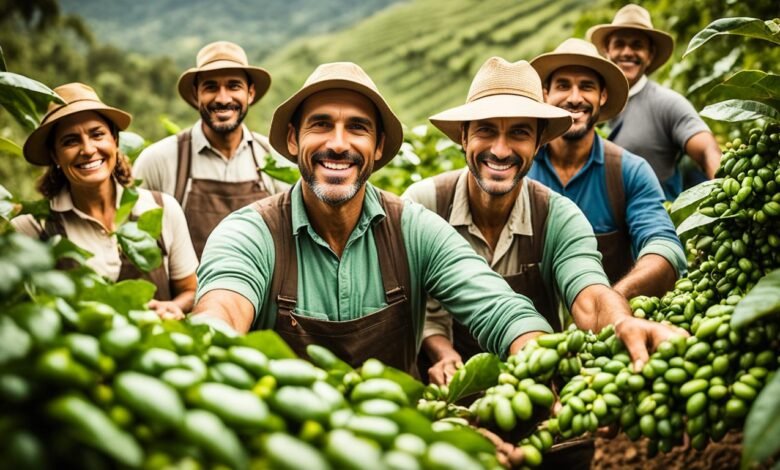
The smell of freshly brewed coffee wakes you up and gives you a boost. But have you thought about how your morning coffee gets from the bean to your cup? Today, making sure our coffee is sustainable is very important.
Alex, a barista at Java Love Coffee Roasting Co., loves serving sustainable coffee. He uses fair trade certified and organic beans. These beans come from Rainforest Alliance certified farms that help biodiversity and protect nature. Java Love’s focus on ethical and eco-friendly practices makes them stand out. Their customers appreciate the positive impact their coffee has.
Key Takeaways
- Sustainable coffee practices focus on protecting the environment, being socially responsible, and ensuring fair trade.
- Traditional coffee farming can harm forests and animals, but sustainable methods help nature.
- Fair trade and direct trade help farmers get a fair wage and the resources they need.
- Using eco-friendly ways to process and roast coffee lowers its environmental impact.
- Certified sustainable coffee gives buyers a choice that’s better for the planet and people.
The Importance of Sustainable Coffee
The demand for coffee keeps going up, making sustainable coffee practices more important than ever. Traditional coffee making can harm the environment by causing deforestation, destroying habitats, and producing a lot of carbon emissions. But, sustainable coffee is a way to lessen these bad effects and help the environment and coffee-growing communities.
Environmental Impact of Traditional Coffee Practices
The traditional coffee industry has been bad for the environment. Clearing land for coffee plantations has destroyed forests and harmed ecosystems. Also, using synthetic pesticides and fertilizers has polluted soil and water.
Benefits of Sustainable Coffee Production
Sustainable coffee is different. It uses organic and shade-grown methods that protect nature and cut down on carbon emissions. Organic farming doesn’t use harmful chemicals. Shade-grown coffee keeps trees that help many species. Fair trade makes sure farmers get a fair pay, letting them invest in sustainable farming.
Choosing sustainable coffee helps protect the environment and supports coffee communities. It ensures the coffee industry’s future and meets the demand for products that are good for the planet and people.
“The future of coffee depends on our ability to adopt sustainable practices today.”
Sustainable Coffee Farming Methods
The coffee industry is facing big challenges with environmental sustainability and social responsibility. New farming methods are being developed as solutions. Organic Coffee Cultivation and Shade-Grown Coffee with Agroforestry are leading the way.
Organic Coffee Cultivation
Organic coffee farming doesn’t use synthetic pesticides or fertilizers. This protects the soil, water, and local ecosystems. It’s a natural way to care for the land and keep coffee workers and consumers safe.
Shade-Grown Coffee and Agroforestry
Shade-grown coffee grows under taller trees, saving biodiversity by offering homes to plants and animals. Agroforestry mixes trees and crops to improve soil health and store carbon. These methods help the environment and coffee farmers by supporting biodiversity, climate resilience, and fair work conditions.
By using these sustainable methods, coffee growers lessen their environmental impact. They support local communities and offer high-quality, ethically-sourced coffee. As more people want sustainable coffee, these practices are key for the coffee industry’s future.
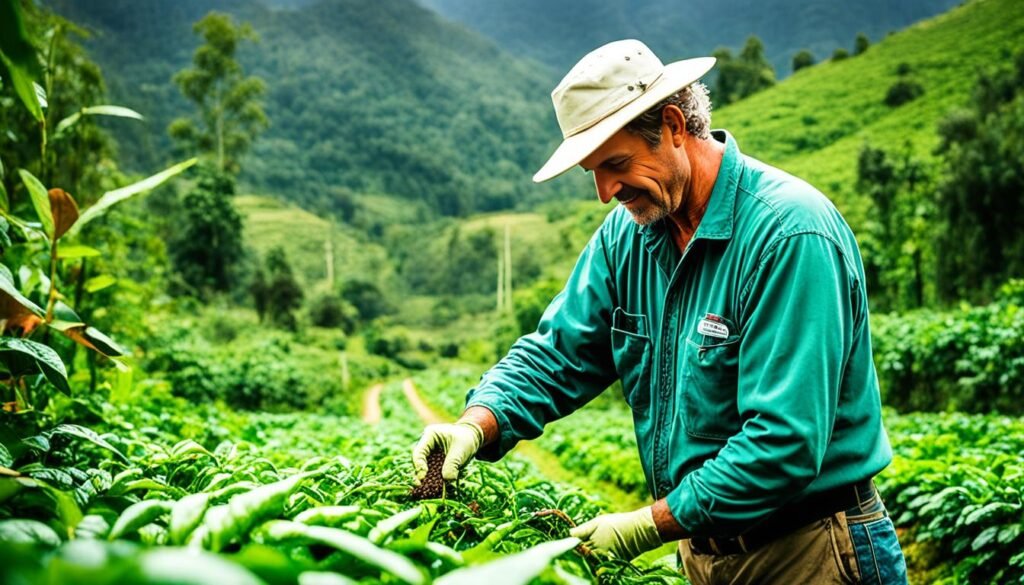
Fair Trade and Direct Trade Coffee
Sustainable coffee practices go beyond the farm. They also affect how we buy and drink our coffee. Fair Trade and Direct Trade coffee are key to social and economic sustainability in the Sustainable Coffee Supply Chain.
Fair Trade Coffee makes sure farmers get a fair price for their coffee. They also get access to healthcare and education. Fair Trade USA and Fairtrade America set the rules for this certification. They push for farming methods that are good for the planet, like organic farming.
Even though more people want Fair Trade coffee, it’s still a small part of the market. Getting certified can be hard for farmers because of the rules.
Direct Trade Coffee goes further by connecting coffee roasters directly with farmers. This method means better quality, fair prices, and transparency. It helps farmers get a good price for their beans and supports sustainable farming and community growth.
“Fair trade certification guarantees a minimum price for coffee, but does not shield producers from global price fluctuations.”
Fair Trade and Direct Trade coffee help coffee-growing communities a lot. They improve living conditions and encourage farming that’s good for the planet. By choosing these types of coffee, we can make a big difference in the lives of those who grow our coffee.
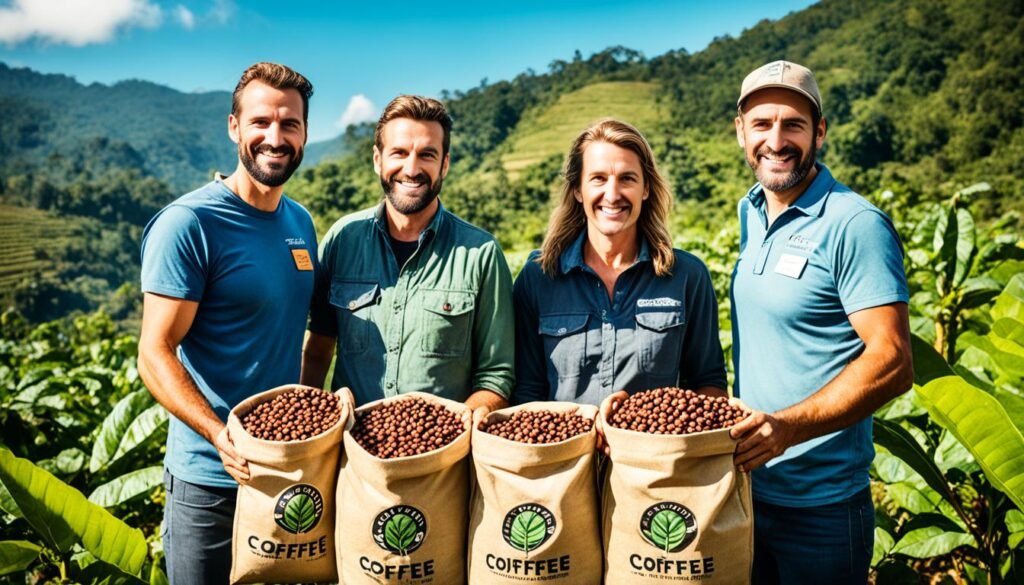
Sustainable Coffee Processing and Roasting
Coffee lovers are now paying more attention to how their favorite drink affects the planet. The coffee industry is changing to make processing and roasting more sustainable. These changes aim to cut down on waste and carbon emissions.
Energy-Efficient Roasting Techniques
Roasting coffee is a big energy user. New roasting methods are being used to use less energy and produce fewer emissions. For example, the Loring Falcon S15 roaster is 80% fuel efficient. This makes it a better choice for roasters who care about the planet.
Reducing Emissions and Waste
Processing and packaging coffee can also be made more sustainable. Recycling heat, cutting down on waste, and using eco-friendly packaging are some ways to do this. Giesen coffee roasters use SFE Filters and Catalytic Emission Cleaners to reduce emissions during roasting.
By using sustainable methods for processing and roasting coffee, the industry can help the planet. This meets the growing demand for coffee that is good for the earth and fair to everyone involved.
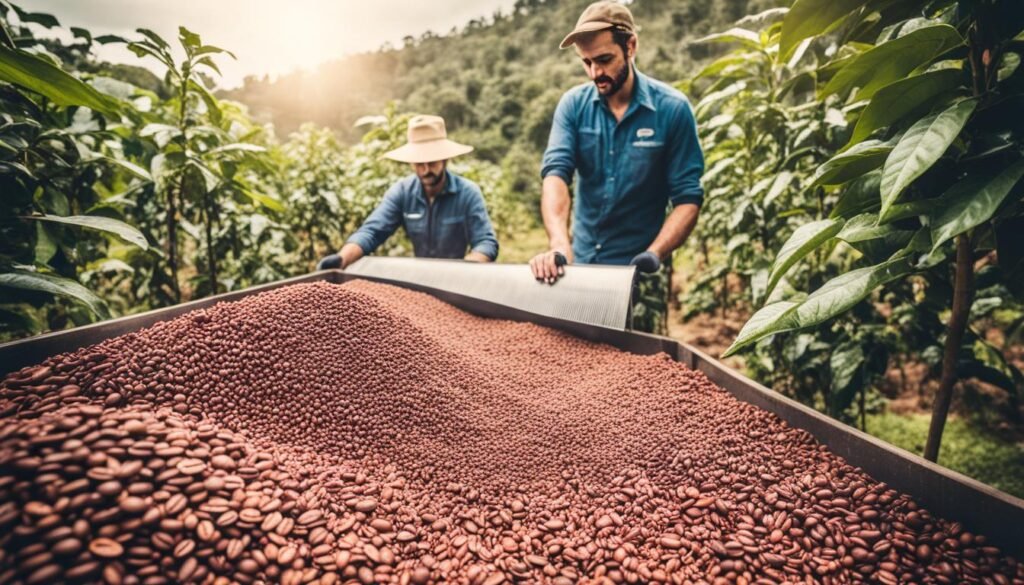
Sustainable Coffee Certifications
Many certification programs have come up to help make coffee production more sustainable. These include Rainforest Alliance, Fair Trade, and Organic Coffee. They help make sure coffee is made in a way that’s good for the planet and people.
The Rainforest Alliance makes sure coffee is grown in a way that protects nature and helps communities. Fair Trade ensures farmers get a fair price for their coffee. This lets them invest in their farms and communities.
Organic Coffee means the coffee is grown without harmful chemicals. It also means protecting water and wildlife. These certifications let buyers know their coffee supports good causes.
| Certification | Key Focus | Percentage in Nespresso and Keurig Pods |
|---|---|---|
| Rainforest Alliance | Environmental protection, biodiversity conservation, and community well-being | Included |
| Fair Trade | Ensuring fair prices and supporting sustainable livelihoods for coffee producers | Included |
| Organic Coffee | Promoting environmentally-friendly farming practices and protecting the environment | Included |
Choosing coffee with these certifications helps businesses and consumers make a difference. It supports the coffee industry’s efforts to be more responsible.
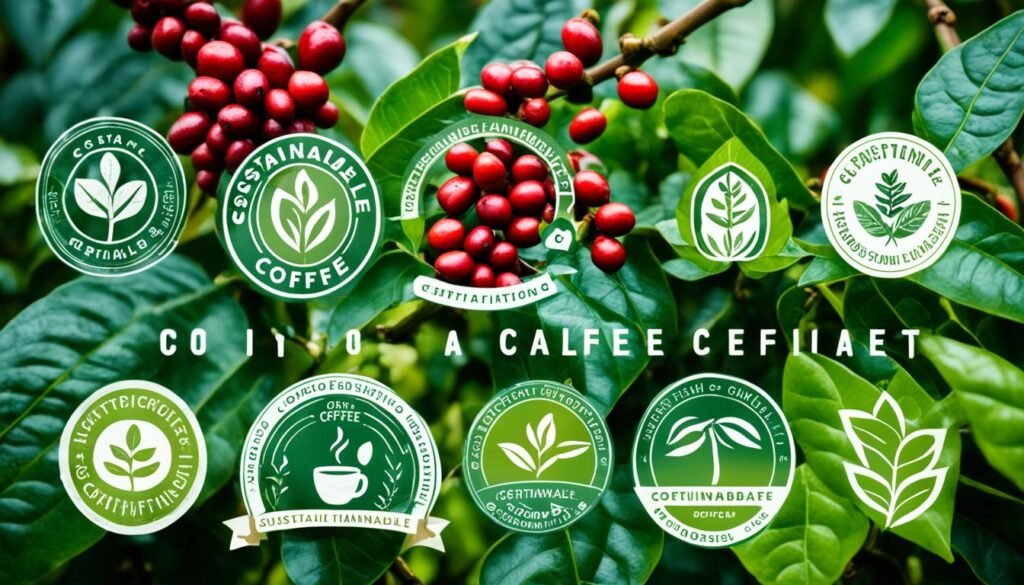
Eco-Friendly Coffee Brewing and Consumption
Making coffee more sustainable goes beyond just how it’s made and where it comes from. Using Eco-Friendly Coffee Brewing methods like pour-over or French press helps. These methods use less energy and create less waste than traditional coffee makers. They also cut down on the need for single-use pods or filters, which helps reduce Reducing Coffee Waste.
A study at the University of Quebec at Chicoutimi showed that instant coffee is the best choice for the planet if made right. Traditional drip coffee is the worst option. Also, using more coffee and water for coffee capsules can make them better for the environment.
Energy-Efficient Coffee Machines
Some coffee machines are really good at saving energy. For example, the Marco MIX and Marco FRIIA machines use 70% less energy than others. These machines help lower your carbon footprint by being more energy-efficient.
Reducing Waste and Single-Use Products
Using things you can reuse, like cups and mugs, also helps the planet. Every year, billions of cups are thrown away, with the U.S. using about 50 billion alone. This is a big problem.
By choosing to be more sustainable, we can enjoy great coffee without harming the planet. Recycling and teaching customers about sustainability are key to making a difference. These actions help reduce waste and promote the importance of drinking coffee in a green way.
| Company | Sustainability Score |
|---|---|
| Five Senses Coffee | 101.7 |
| Minor Figures | 81.8 |
Companies like Five Senses Coffee and Minor Figures are leading the way in sustainability. They scored high in the B Impact Assessment, which looks at their social and environmental actions.
“Sustainable coffee practices advocate for environmentally friendly methods of sourcing coffee beans and sustainable production means.”
Sustainable Coffee
In the world of coffee, sustainability is key. Sustainable Coffee, Eco-Friendly Coffee, and Ethical Coffee are more than just words. They mean a new way of making, processing, and drinking coffee. This approach focuses on taking care of the environment, being fair to people, and making sure it’s financially possible.
The move to sustainable coffee has been slow but sure. By 2009, over 8% of the world’s coffee was certified as sustainable. By 2016, this number jumped to at least 34%. This shows how important sustainable coffee is becoming.
Sustainable coffee includes many things like organic farming and fair trade. It also means using less energy in processing. These steps help reduce harm to the environment, pay fair wages, and support the coffee industry’s future.
Big names like Starbucks, Nespresso, and McDonald’s are leading in sustainable coffee. Starbucks gets 99% of its coffee through a strict sustainability standard. Nespresso buys over half of its coffee as sustainable.
As buyers, we can help make a difference. By choosing Sustainable Coffee, Eco-Friendly Coffee, and Ethical Coffee, we support a better coffee industry. This helps coffee farmers, protects nature, and benefits everyone involved.
The Role of Coffee Drinkers and Businesses
Coffee lovers and companies are key to making coffee more sustainable. By choosing products with certifications like Rainforest Alliance, Fair Trade, and Organic, we help farmers and the planet. These labels mean the coffee is made in ways that are good for the earth and people.
Supporting Sustainable Coffee Initiatives
Choosing sustainable coffee helps lessen the coffee industry’s environmental harm. Look for brands that focus on things like organic farming and saving water. They also work on reducing waste.
Promoting Transparency and Traceability
Companies can change the coffee world by working with sustainable suppliers and offering eco-friendly ways to brew. They should also be open about where their coffee comes from. This lets customers make better choices and keeps the industry honest.
Together, coffee lovers and companies can push for more sustainable coffee. This teamwork is key to a greener future for coffee.
| Sustainable Coffee Practices | Benefits |
|---|---|
| Organic Farming | Reduced chemical use, improved soil health, and biodiversity conservation. |
| Fair Trade Certification | Ensures fair wages and good working conditions for farmers and workers. |
| Shade-Grown Coffee | Protects rainforests and provides habitats for migratory birds and other wildlife. |
| Waste Reduction in Coffee Shops | Minimizes environmental impact and promotes sustainable consumption. |
“Sustainable coffee practices not only benefit the environment but also support the livelihoods of the farmers and communities who produce this beloved beverage.”
Conclusion
Sustainable coffee practices help solve big environmental and social issues in the coffee world. They include things like organic farming and agroforestry. Also, fair trade and eco-friendly processing are key parts of this movement.
Even with these efforts, there’s still a lot to do. Issues like climate change, deforestation, water scarcity, and poor working conditions are still big problems. If everyone works together, we can keep making progress towards a better future for coffee and the earth.
Labels like Rainforest Alliance, Fair Trade, and USDA Organic show that coffee is made in a sustainable way. They mean the coffee is grown and made under strict rules for the environment and workers. By choosing these sustainable coffees, you help make a difference. You support efforts for more openness, tracking, and positive changes in the coffee world.
